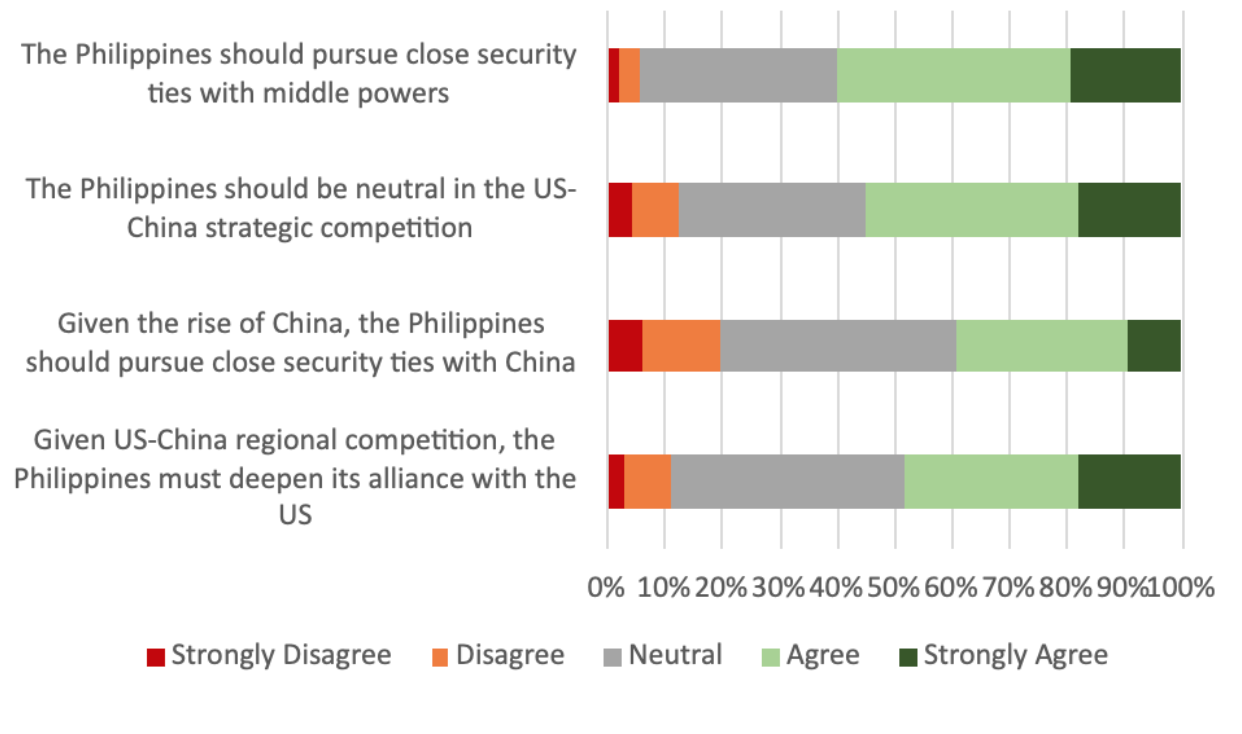On May 23, 2023, Amador Research Services, along with the Foundation for National Interest, published the second annual Philippine National Security Survey which found that the majority of Filipino security experts prefer multilateralism and pursuing an independent foreign policy amid recent US-China tensions.
As President Ferdinand Marcos Jr.’s administration focuses on regional strategic issues, the Philippine advisory firm Amador Research Services and the Foundation for National Interest conducted its second annual survey on a variety of national security issues. Over 1,200 civilian policy officers, academics, uniformed personnel, and policymakers responded to share their perspectives on economic, defense, and foreign policy issues to advise the policymaking of the current administration.
Under President Marcos, the United States and the Philippines have strengthened military and economic ties. In a series of meetings last month (May 2023), Secretary of Defense Lloyd J. Austin III and Philippine President Ferdinand Marcos Jr. reaffirmed the two nations’ commitment to the Mutual Defense Treaty and expanding security cooperation in the South China Sea.
Major findings of the survey were that the top national security issues facing the Philippines are human security threats, West Philippine Sea (better known as the South China Sea) encroachments, and natural and human disasters. The majority of respondents agree that the military should become more oriented toward external defense rather than internal security or domestic law and order. These findings align with recent statements made by the US and Philippines governments on expanding operational cooperation in maritime security.
The Philippine experts surveyed agree on pursuing multilateralism through frameworks including the Regional Comprehensive Economic Partnership (RCEP), Association of Southeast Asian Nations (ASEAN), and the Indo-Pacific Economic Framework (IPEF). The survey found that ASEAN is the top choice of partner for agriculture, blue economy, environment, Fintech, ICT, Infrastructure, and renewable energy efforts.

Most respondents demonstrated a strong preference for an independent foreign policy. The results seem to demonstrate a security consensus that the Philippines should improve its defense capabilities while avoiding entanglements in regional issues such as Taiwan. Nearly forty percent of the experts surveyed demonstrate a growing interest in China as a security partner, but this is divisive, with forty percent also opposed. The results showed a preference for the United States, Japan, and Australia as diplomatic partners.
Conversely, results also showed that the least preferred partners were China, Russia, and the United States which reflects a division over involvement in the US-China competition. Furthermore, forty percent of participants believe that the Philippines should engage all countries for diplomatic partnerships which reflects the multilateral and independent foreign policy desired by most Philippines security experts. The Philippine National Security Survey reflects the preference of national security elites for an independent foreign policy which allows for strategic autonomy in pursuit of national interests and security while also actively engaging in multilateral issue-based cooperation.
Jordan Cheney is a participant in the Young Professionals Program at the East-West Center in Washington. She has recently graduated from American University with a Bachelor's in Political Science specializing in comparative politics and a minor in Asia, Pacific, Diaspora Studies.